Discover Vital Remnants
Vital Remnants

Vital Remnants
Author: McConnell Center
Subscribed: 12Played: 168Subscribe
Share
© All rights reserved
Description
20 years after the publication of Vital Remnants: America's Founding and the Western Tradition, a book that set out to help America remember her vital roots in the western tradition, Dr. Gary L. Gregg II takes up the title of Vital Remnants once more to continue the mission of serving the future by remembering, thinking about, and learning from the great thinkers of the past. Join Dr. Gregg as he guides listeners through some of the most important texts in human history. Whether you are looking for help in reaching a long abandoned reading goal and continuing your life-long learning, or looking for leadership and life lessons from something deeper than the latest self-help book, Gregg brings a quarter of a century's worth of experience teaching leadership to help you along the way. Vital Remnants from our shared past await to inspire, encourage, and teach us today just as they changed the world we have inherited.
Subscribe to our newsletter and receive McConnell Center updates directly in your mailbox: https://confirmsubscription.com/h/r/C970CD2C3514492B
Download Dr. Gregg's Guide to The Prince here: http://louisville.edu/mcconnellcenter/programs/military/meditations/greggs-leadership-guide-to-the-prince/at_download/file
Download Dr. Gregg's Guide to The Republic here: http://louisville.edu/mcconnellcenter/programs/military/meditations/greggs-reading-guide-to-thinking-with-plato/at_download/file
Please share any thoughts, questions, comments, or concerns with us via email at connor.tracy@louisville.edu
Subscribe to our newsletter and receive McConnell Center updates directly in your mailbox: https://confirmsubscription.com/h/r/C970CD2C3514492B
Download Dr. Gregg's Guide to The Prince here: http://louisville.edu/mcconnellcenter/programs/military/meditations/greggs-leadership-guide-to-the-prince/at_download/file
Download Dr. Gregg's Guide to The Republic here: http://louisville.edu/mcconnellcenter/programs/military/meditations/greggs-reading-guide-to-thinking-with-plato/at_download/file
Please share any thoughts, questions, comments, or concerns with us via email at connor.tracy@louisville.edu
67 Episodes
Reverse
In this introductory episode of the Vital Remnants podcast, producer Connor Tracy sits down with show host Dr. Gary L. Gregg II to discuss the inspiration, overall vision, and structure of the podcast. Subscribe to our newsletter and receive McConnell Center updates directly in your mailbox Please share any thoughts, questions, comments, or concerns with us via email at connor.tracy@louisville.edu This podcast is a production of the McConnell Center at the University of Louisville. For more information, including upcoming events, please visit us online at mcconnellcenter.org or on social media at: Facebook: @mcconnellcenter Instagram: @ulmcenter Twitter: @ULmCenter Intro: Natalie Smith, McConnell Center Civic Education Coordinator Host: Dr. Gary L. Gregg II, McConnell Center Director Producer: Connor Tracy, McConnell Center SBS Coordinator
Episode Summary McConnell Center Director Dr. Gary L. Gregg II offers his thoughts on how to make the most of our time during this crisis. Links Mentioned Dr. Gregg's op-ed pieces, including "The Gift of Solitude and Time" can be found here: https://www.theepochtimes.com/author-gary-l-gregg Stay Connected Visit us at McConnellcenter.org Subscribe to our newsletter Facebook: @mcconnellcenter Instagram: @ulmcenter Twitter: @ULmCenter This podcast is a production of the McConnell Center at the University of Louisville. Views expressed in this show are those of the participants and not necessarily those of the McConnell Center.
In this inaugural episode of our walk through Plato's Republic, Dr. Gary Gregg introduces listeners to the importance of "The Republic" and lays out a few key concepts of Platonic thought that will help inform the modern reader's understanding as they work through the text. He then walks through the various definitions of Justice presented throughout the dialogue and discusses the implications of each for both leadership and politics(20:00). The question of what is necessary to compel good people to rule is considered (36:15), followed by The "Ring of Gyges" story(46:00). He then recounts Adeimantus's assertion that society, culture and family influence our actions and shows how this contributes to the nature v. nurture argument (53:19). Dr. Gregg ends with an overview of what will be covered in Target 2 (55:47). Target 1 Reading: Book I and Book II through 367e, pp. 3-44 of "The Republic of Plato", 2nd edition, translated by Allan Bloom (Basic Books, 1968 and 1991). Download Dr. Gregg's Guide to The Republic here Subscribe to our newsletter and receive McConnell Center updates directly in your mailbox Please share any thoughts, questions, comments, or concerns with us via email at connor.tracy@louisville.edu This podcast is a production of the McConnell Center at the University of Louisville. For more information, including upcoming events, please visit us online at mcconnellcenter.org or on social media at: Facebook: @mcconnellcenter Instagram: @ulmcenter Twitter: @ULmCenter Intro: Bridget Kim Host: Dr. Gary L. Gregg II Editor: Connor Tracy Music: Selected from http://freemusicarchive.org/music/Damiano_Baldoni/
In the second episode of this season of Vital Remnants, Dr. Gary Gregg begins by comparing Plato's philosophical assumptions about the origin of communities with those that have shaped the modern understanding, including the views of Hobbes, Locke and Rousseau (5:11). Gregg then dives into the creation of Plato's city and discusses the origins of war (13:20), the need for guardians, and the question of who will guard against them. Plato's metaphor of the "noble puppies" is examined along with the education of the guardian class (17:57). Other key topics include censorship (24:22), "The Noble Lie" (32:37), culture and corruption (34:28), music (44:01), and the very important relationship between politics and culture (47:40). Dr. Gregg ends with highlights of what will be covered in Target 3 (53:19). Target 2 Reading: Books II, III, & IV pp. 40-103 of "The Republic of Plato", 2nd edition, translated by Allan Bloom (Basic Books, 1968 and 1991). Download Dr. Gregg's Guide to The Republic here Subscribe to our newsletter and receive McConnell Center updates directly in your mailbox Please share any thoughts, questions, comments, or concerns with us via email at connor.tracy@louisville.edu This podcast is a production of the McConnell Center at the University of Louisville. For more information, including upcoming events, please visit us online at mcconnellcenter.org or on social media at: Facebook: @mcconnellcenter Instagram: @ulmcenter Twitter: @ULmCenter Intro: Bridget Kim Host: Dr. Gary L. Gregg II Editor: Connor Tracy Music: Selected from http://freemusicarchive.org/music/Damiano_Baldoni/
In this episode of Vital Remnants, Dr. Gary Gregg discusses Plato's call for the combination of political power and philosophy within our leaders (1:34), the three parts of society (5:00), Plato's tests for leadership (7:31), and the "Myth of the Metals" (15:41). He then revisits education (22:28), the four parts of virtue (26:07), Plato's definition of justice (32:05) and the burden of leadership (36:31). Dr. Gregg concludes by examining the relationship between the virtues and the parts of society (38:03), how the parts of society correlate to parts of the individual soul (39:13), the tripartite soul (42:40), C.S. Lewis's The Abolition of Man (50:57), and what all of this means for leadership today (54:35). Target 3 Reading: Books III, IV, & V, pp. 91-152 of "The Republic of Plato", 2nd edition, translated by Allan Bloom (Basic Books, 1968 and 1991). Download Dr. Gregg's Guide to The Republic here Subscribe to our newsletter and receive McConnell Center updates directly in your mailbox Please share any thoughts, questions, comments, or concerns with us via email at connor.tracy@louisville.edu This podcast is a production of the McConnell Center at the University of Louisville. For more information, including upcoming events, please visit us online at mcconnellcenter.org or on social media at: Facebook: @mcconnellcenter Instagram: @ulmcenter Twitter: @ULmCenter Intro: Bridget Kim Host: Dr. Gary L. Gregg II Editor: Connor Tracy Music: Selected from http://freemusicarchive.org/music/Damiano_Baldoni/
In this episode, Dr. Gary Gregg outlines Plato's views on political leadership and uses this framework to consider today's institutions and public figures. He walks us through the Allegory of the Ship and the famous Allegory of the Cave. Lastly, Connor Tracy joins Dr. Gregg to discuss Plato's concept of the "Divided Line." Target 4 Reading: Books V, VI & VII, pp. 153-220 of "The Republic of Plato", 2nd edition, translated by Allan Bloom (Basic Books, 1968 and 1991). Download Dr. Gregg's Guide to The Republic here Subscribe to our newsletter and receive McConnell Center updates directly in your mailbox Please share any thoughts, questions, comments, or concerns with us via email at connor.tracy@louisville.edu This podcast is a production of the McConnell Center at the University of Louisville. For more information, including upcoming events, please visit us online at mcconnellcenter.org or on social media at: Facebook: @mcconnellcenter Instagram: @ulmcenter Twitter: @ULmCenter Intro: Bridget Kim Host: Dr. Gary L. Gregg II Guest & Editor: Connor Tracy Music: Selected from freemusicarchive.org/music/Damiano_Baldoni/
Having now arrived at one of the most important sections of The Republic, Dr. Gary Gregg discusses Plato's types of governments and how they decline from the best to the worst. Spoiler alert–democracy is certainly not the best in his view. Listeners are encouraged to consider Plato's strong indictment of democracy and to take a hard look at our American system through this lens to see how closely we compare. Remember too that government is "man writ-large," and therefore he is talking not only about the types of political regimes, but also–and quite possibly more importantly–the types of individual souls. Target 5 Reading: Book VIII, pp. 221-249 of "The Republic of Plato", 2nd edition, translated by Allan Bloom (Basic Books, 1968 and 1991). Download Dr. Gregg's Guide to The Republic here Subscribe to our newsletter and receive McConnell Center updates directly in your mailbox Please share any thoughts, questions, comments, or concerns with us via email at connor.tracy@louisville.edu This podcast is a production of the McConnell Center at the University of Louisville. For more information, including upcoming events, please visit us online at mcconnellcenter.org or on social media at: Facebook: @mcconnellcenter Instagram: @ulmcenter Twitter: @ULmCenter Intro: Bridget Kim Host: Dr. Gary L. Gregg II Editor: Connor Tracy Music: Selected from freemusicarchive.org/music/Damiano_Baldoni/
After considering the other types of governments and individuals in last month's installment, Dr. Gary Gregg takes a deeper dive into Plato's outline of the mind and government of the tyrant. He then discusses a new image Plato provides of the human soul in book IX, and concludes by considering the idea of the proper cultivation of one's soul. Target 6 Reading: Book IX, pp. 251-275 of "The Republic of Plato", 2nd edition, translated by Allan Bloom (Basic Books, 1968 and 1991). Download Dr. Gregg's Guide to The Republic here Subscribe to our newsletter and receive McConnell Center updates directly in your mailbox Please share any thoughts, questions, comments, or concerns with us via email at connor.tracy@louisville.edu This podcast is a production of the McConnell Center at the University of Louisville. For more information, including upcoming events, please visit us online at mcconnellcenter.org or on social media at: Facebook: @mcconnellcenter Instagram: @ulmcenter Twitter: @ULmCenter Intro: Bridget Kim Host: Dr. Gary L. Gregg II Editor: Connor Tracy Music: Selected from freemusicarchive.org/music/Damiano_Baldoni/
In this episode of Vital Remnants, Dr. Gary Gregg guides listeners through the final book of The Republic. He first discusses the opening of Book X, in which Plato presents the conflict between poetry and philosophy and spends a significant amount of time criticizing the poets–Homer in particular. Once again we are reminded of the tripartite soul and are challenged to consider how the types of entertainment we consume can corrupt the order of one's soul over time. Dr. Gregg then examines the "Myth of Er," Plato's imaginative story of one man's travels through the afterlife, and concludes with his thoughts on why Plato chose to end The Republicwith this imaginative tale and what it may mean for us today. Target 7 Reading: Book X, pp. 277-303 of "The Republic of Plato", 2nd edition, translated by Allan Bloom (Basic Books, 1968 and 1991). Download Dr. Gregg's Guide to The Republic here Subscribe to our newsletter and receive McConnell Center updates directly in your mailbox Please share any thoughts, questions, comments, or concerns with us via email at connor.tracy@louisville.edu This podcast is a production of the McConnell Center at the University of Louisville. For more information, including upcoming events, please visit us online at mcconnellcenter.org or on social media at: Facebook: @mcconnellcenter Instagram: @ulmcenter Twitter: @ULmCenter Intro: Bridget Kim Host: Dr. Gary L. Gregg II Editor: Connor Tracy Music: Selected from freemusicarchive.org/music/Damiano_Baldoni/
Target 8 Reading Recommendation: Arthur Herman, The Cave and the Light: Plato Versus Aristotle, and the Struggle for the Soul of Western Civilization (Random House, 2013) In this bonus episode, Dr. Gary Gregg recommends a variety of books and authors for listeners to read after finishing up The Republic. Dr. Gregg focuses mainly on Arthur Herman's book, The Cave and the Light: Plato Versus Aristotle, and the Struggle for the Soul of Western Civilization (Random House, 2013), and shares how this work identifies Plato and Aristotle as the two great fountainheads of Western Civilization and traces their influence on future generations, including our own. We hope you have enjoyed reading The Republic and will stick with us as we move on to one of the most popular treatises on political leadership, Niccolò Machiavelli's The Prince. Download Dr. Gregg's Guide to The Republic here Download Dr. Gregg's Guide to The Prince here Subscribe to our newsletter and receive McConnell Center updates directly in your mailbox Please share any thoughts, questions, comments, or concerns with us via email at connor.tracy@louisville.edu This podcast is a production of the McConnell Center at the University of Louisville. For more information, including upcoming events, please visit us online at mcconnellcenter.org or on social media at: Facebook: @mcconnellcenter Instagram: @ulmcenter Twitter: @ULmCenter Intro: Bridget Kim Host: Dr. Gary L. Gregg II Editor: Connor Tracy Music: Selected from freemusicarchive.org/music/Damiano_Baldoni/
For the second season of Vital Remnants, Dr. Gary L. Gregg II will walk listeners through one of the most famous texts on political leadership, Niccolò Machiavelli's The Prince. In this first episode, Dr. Gregg briefly details Machiavelli's historical significance and his approach to reading The Prince. He then shares the first key lesson–to learn from contemporaries and the ancients–and ends by focusing on the second lesson from the selected readings, which emphasizes the importance of perspective when considering politics. Target 1 Reading: Dedicatory Letter, Appendix "Niccolò Machiavelli to Francesco Vettori, Florence, Dec. 10, 1513" pp. 3-4, 107-111 of Niccolò Machiavelli, The Prince, Second Edition, Translated and with an Introduction by Harvey C. Mansfield (Chicago: University of Chicago Press, 1998) Download Dr. Gregg's Guide to The Prince here Subscribe to our newsletter and receive McConnell Center updates directly in your mailbox Please share any thoughts, questions, comments, or concerns with us via email at connor.tracy@louisville.edu This podcast is a production of the McConnell Center at the University of Louisville. For more information, including upcoming events, please visit us online at mcconnellcenter.org or on social media at: Facebook: @mcconnellcenter Instagram: @ulmcenter Twitter: @ULmCenter Intro: Natalie Smith, McConnell Center Civic Education Coordinator Host: Dr. Gary L. Gregg II, McConnell Center Director Producer: Connor Tracy, McConnell Center SBS Coordinator
In this installment of the Vital Remnants Podcast, Dr. Gary Gregg guides readers through the first five chapters of The Prince, identifying eight keys to leadership from the reading. These include lessons on assuming roles of power, learning before you lose and engaging problems before they become too large to remedy. Dr. Gregg also wrestles with the modern-day application of Machiavelli's ideas. Target 2 Reading: Chapters 1-5, pp. 5-21 of Niccolò Machiavelli, The Prince, Second Edition, Translated and with an Introduction by Harvey C. Mansfield (Chicago: University of Chicago Press, 1998) Download Dr. Gregg's Guide to The Prince here Subscribe to our newsletter and receive McConnell Center updates directly in your mailbox Please share any thoughts, questions, comments, or concerns with us via email at connor.tracy@louisville.edu This podcast is a production of the McConnell Center at the University of Louisville. For more information, including upcoming events, please visit us online at mcconnellcenter.org or on social media at: Facebook: @mcconnellcenter Instagram: @ulmcenter Twitter: @ULmCenter Intro: Natalie Smith, McConnell Center Civic Education Coordinator Host: Dr. Gary L. Gregg II, McConnell Center Director Producer: Connor Tracy, McConnell Center SBS Coordinator
In this installment of the Vital Remnants Podcast, Dr. Gary Gregg guides listeners through chapters six and seven of Niccolo Machiavelli's The Prince, identifying seven lessons for modern leaders. Those lessons include warnings about founding new enterprises, a caution to grow your enterprise slowly rather than quickly, and a core lesson for contemporary political leaders about the importance of gaining popular support and some techniques for doing it. Target 3 Reading: Chapters 6-8, pp. 21-38 of Niccolò Machiavelli, The Prince, Second Edition, Translated and with an Introduction by Harvey C. Mansfield (Chicago: University of Chicago Press, 1998) Download Dr. Gregg's Guide to The Prince here Subscribe to our newsletter and receive McConnell Center updates directly in your mailbox Please share any thoughts, questions, comments, or concerns with us via email at connor.tracy@louisville.edu This podcast is a production of the McConnell Center at the University of Louisville. For more information, including upcoming events, please visit us online at mcconnellcenter.org or on social media at: Facebook: @mcconnellcenter Instagram: @ulmcenter Twitter: @ULmCenter Intro: Natalie Smith, McConnell Center Civic Education Coordinator Host: Dr. Gary L. Gregg II, McConnell Center Director Producer: Connor Tracy, McConnell Center SBS Coordinator
In today's episode, Dr. Gary Gregg distills four great leadership lessons from chapters 9-10 of Niccolo Machiavelli's The Prince. Dr. Gregg's lessons include the following: leaders find great benefit in doing good when their followers expect evil; leaders must make themselves indispensable; peace is achieved through strength; and the loyalty of the people relies as much on what they give, as what is given them. Target 4 Reading: Chapters 9-10, pp. 38-44 of Niccolò Machiavelli, The Prince, Second Edition, Translated and with an Introduction by Harvey C. Mansfield (Chicago: University of Chicago Press, 1998) Download Dr. Gregg's Guide to The Prince here Subscribe to our newsletter and receive McConnell Center updates directly in your mailbox Please share any thoughts, questions, comments, or concerns with us via email at connor.tracy@louisville.edu This podcast is a production of the McConnell Center at the University of Louisville. For more information, including upcoming events, please visit us online at mcconnellcenter.org or on social media at: Facebook: @mcconnellcenter Instagram: @ulmcenter Twitter: @ULmCenter Intro: Natalie Smith, McConnell Center Civic Education Coordinator Host: Dr. Gary L. Gregg II, McConnell Center Director Producer: Connor Tracy, McConnell Center SBS Coordinator
In today's episode, Dr. Gary Gregg covers the next five great leadership lessons of Niccolo Machiavelli's The Prince. These lessons include the following: money alone will not incentivize men to make great sacrifices; leaders should care only for war (prepare for war during peace in order to be ready when future troubles arise); leaders should learn how not to be good; it is impossible to obtain a perfect reputation, but one must avoid dangerous epitaphs; and the importance of controlling wealth while still building a reputation of generosity. Target 5 Reading: Chapters 11-15, pp. 45-62 of Niccolò Machiavelli, The Prince, Second Edition, Translated and with an Introduction by Harvey C. Mansfield (Chicago: University of Chicago Press, 1998) Download Dr. Gregg's Guide to The Prince here Subscribe to our newsletter and receive McConnell Center updates directly in your mailbox Please share any thoughts, questions, comments, or concerns with us via email at connor.tracy@louisville.edu This podcast is a production of the McConnell Center at the University of Louisville. For more information, including upcoming events, please visit us online at mcconnellcenter.org or on social media at: Facebook: @mcconnellcenter Instagram: @ulmcenter Twitter: @ULmCenter Intro: Natalie Smith, McConnell Center Civic Education Coordinator Host: Dr. Gary L. Gregg II, McConnell Center Director Producer: Connor Tracy, McConnell Center SBS Coordinator
In today's episode, Dr. Gregg pulls out six great lessons of leadership from the text, including one of Machiavelli's most famous assertions: "It is better to be feared than loved, if you cannot be both." Target 6 Reading: Chapters 16-18, pp. 62-71 of Niccolò Machiavelli, The Prince, Second Edition, Translated and with an Introduction by Harvey C. Mansfield (Chicago: University of Chicago Press, 1998) Download Dr. Gregg's Guide to The Prince here Subscribe to our newsletter and receive McConnell Center updates directly in your mailbox Please share any thoughts, questions, comments, or concerns with us via email at connor.tracy@louisville.edu This podcast is a production of the McConnell Center at the University of Louisville. For more information, including upcoming events, please visit us online at mcconnellcenter.org or on social media at: Facebook: @mcconnellcenter Instagram: @ulmcenter Twitter: @ULmCenter Intro: Natalie Smith, McConnell Center Civic Education Coordinator Host: Dr. Gary L. Gregg II, McConnell Center Director Producer: Connor Tracy, McConnell Center SBS Coordinator
How does one become great? Should a leader be the bearer of bad news to his/her people? Dr. Gary Gregg, McConnell Center Director, shares Machiavelli's answers to these questions and more as he presents the next four great lessons of The Prince. Target 7 Reading: Chapters 19-20, pp. 71-87 of Niccolò Machiavelli, The Prince, Second Edition, Translated and with an Introduction by Harvey C. Mansfield (Chicago: University of Chicago Press, 1998) Download Dr. Gregg's Guide to The Prince here Subscribe to our newsletter and receive McConnell Center updates directly in your mailbox Please share any thoughts, questions, comments, or concerns with us via email at connor.tracy@louisville.edu This podcast is a production of the McConnell Center at the University of Louisville. For more information, including upcoming events, please visit us online at mcconnellcenter.org or on social media at: Facebook: @mcconnellcenter Instagram: @ulmcenter Twitter: @ULmCenter Intro: Natalie Smith, McConnell Center Civic Education Coordinator Host: Dr. Gary L. Gregg II, McConnell Center Director Producer: Connor Tracy, McConnell Center SBS Coordinator
In this episode of Vital Remnants, Dr. Gary Gregg shares the next five great leadership lessons of Machiavelli's The Prince. These lessons include how to strategically approach conflict, manage those under your supervision, and select trusted advisors. Target 8 Reading: Chapters 21-23, pp. 87-95 of Niccolò Machiavelli, The Prince, Second Edition, Translated and with an Introduction by Harvey C. Mansfield (Chicago: University of Chicago Press, 1998) Download Dr. Gregg's Guide to The Prince here Subscribe to our newsletter and receive McConnell Center updates directly in your mailbox Please share any thoughts, questions, comments, or concerns with us via email at connor.tracy@louisville.edu This podcast is a production of the McConnell Center at the University of Louisville. For more information, including upcoming events, please visit us online at mcconnellcenter.org or on social media at: Facebook: @mcconnellcenter Instagram: @ulmcenter Twitter: @ULmCenter Intro: Natalie Smith, McConnell Center Civic Education Coordinator Host: Dr. Gary L. Gregg II, McConnell Center Director Producer: Connor Tracy, McConnell Center SBS Coordinator
In this episode of Vital Remnants, Dr. Gary Gregg reveals his final great leadership lesson of Machiavelli's The Prince. We hope you have enjoyed this series and are looking forward to next season! Target 9 Reading: Chapters 24-26 pp. 96-105 of Niccolò Machiavelli, The Prince, Second Edition, Translated and with an Introduction by Harvey C. Mansfield (Chicago: University of Chicago Press, 1998) Download Dr. Gregg's Guide to The Prince here Subscribe to our newsletter and receive McConnell Center updates directly in your mailbox Please share any thoughts, questions, comments, or concerns with us via email at connor.tracy@louisville.edu This podcast is a production of the McConnell Center at the University of Louisville. For more information, including upcoming events, please visit us online at mcconnellcenter.org or on social media at: Facebook: @mcconnellcenter Instagram: @ulmcenter Twitter: @ULmCenter Intro: Natalie Smith, McConnell Center Civic Education Coordinator Host: Dr. Gary L. Gregg II, McConnell Center Director Producer: Connor Tracy, McConnell Center SBS Coordinator
Summary In Season 3 of Vital Remnants, McConnell Center Director Dr. Gary L. Gregg II will guide listeners through The Last Days of Socrates, a collection of four of Plato's dialogues. This first episode introduces the series and discusses "Euthyphro" in detail. Corresponding Reading "Euthyphro," pages 6-26 of Plato, The Last Days of Socrates: Euthyphro, Apology, Crito, Phaedo. Translated with Introductions and Notes by Christopher Rowe (New York, Penguin Books, 2010) Important Links Download Dr. Gregg's Guide to The Last Days of Socrates here Subscribe to our newsletter and receive McConnell Center updates directly in your mailbox Please share any thoughts, questions, comments, or concerns with us via email at connor.tracy@louisville.edu This podcast is a production of the McConnell Center at the University of Louisville. For more information, including upcoming events, please visit us online at mcconnellcenter.org or on social media at: Facebook: @mcconnellcenter Instagram: @ulmcenter Twitter: @ULmCenter Contributors Intro: Natalie Smith, McConnell Center Civic Education Coordinator Host: Dr. Gary L. Gregg II, McConnell Center Director Producer: Connor Tracy, McConnell Center SBS Coordinator


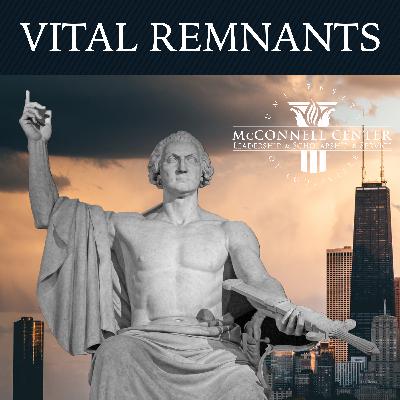


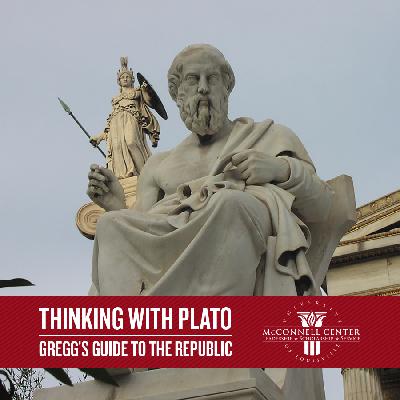
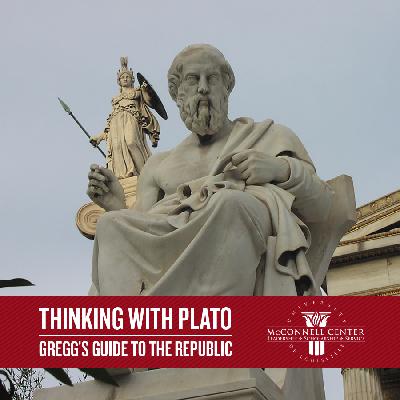
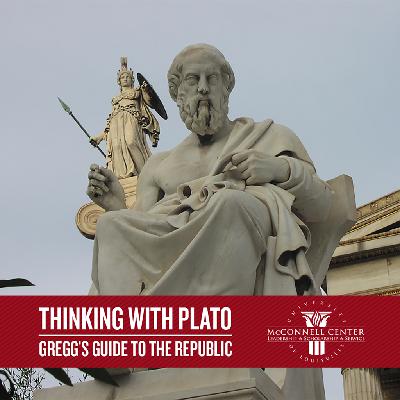
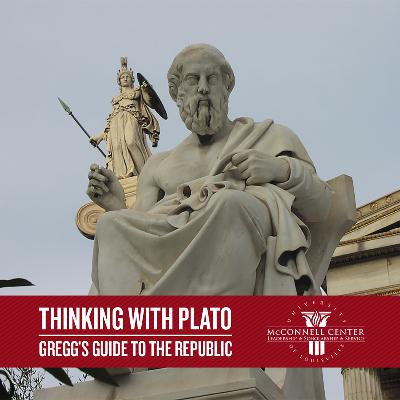




thank you so much Doctor. it was very informative. please talk about aristotle tragedy and if his order is applicable to recent tragedies